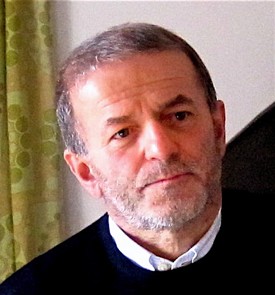Studiare
In questa sezione è possibile reperire le informazioni riguardanti l'organizzazione pratica del corso, lo svolgimento delle attività didattiche, le opportunità formative e i contatti utili durante tutto il percorso di studi, fino al conseguimento del titolo finale.
Calendario accademico
Il calendario accademico riporta le scadenze, gli adempimenti e i periodi rilevanti per la componente studentesca, personale docente e personale dell'Università. Sono inoltre indicate le festività e le chiusure ufficiali dell'Ateneo.
L’anno accademico inizia il 1° ottobre e termina il 30 settembre dell'anno successivo.
Calendario didattico
Il calendario didattico indica i periodi di svolgimento delle attività formative, di sessioni d'esami, di laurea e di chiusura per le festività.
| Periodo | Dal | Al |
|---|---|---|
| I sem. | 1-ott-2014 | 30-gen-2015 |
| II sem. | 2-mar-2015 | 12-giu-2015 |
| Sessione | Dal | Al |
|---|---|---|
| Sessione straordinaria appelli d'esame | 2-feb-2015 | 27-feb-2015 |
| Sessione estiva appelli d'esame | 15-giu-2015 | 31-lug-2015 |
| Sessione autunnale appelli d'esame | 1-set-2015 | 30-set-2015 |
| Sessione | Dal | Al |
|---|---|---|
| Sessione autunnale appello di laurea 2014 | 24-ott-2014 | 24-ott-2014 |
| Sessione invernale appello di laurea 2015 | 12-mar-2015 | 12-mar-2015 |
| Sessione estiva appello di laurea 2015 | 22-lug-2015 | 22-lug-2015 |
| Sessione autunnale appello di laurea 2015 | 23-ott-2015 | 23-ott-2015 |
| Sessione invernale appello di laurea 2016 | 10-mar-2016 | 10-mar-2016 |
| Periodo | Dal | Al |
|---|---|---|
| Vacanze di Natale | 22-dic-2014 | 6-gen-2015 |
| Vacanze di Pasqua | 2-apr-2015 | 7-apr-2015 |
| Ricorrenza del Santo Patrono | 21-mag-2015 | 21-mag-2015 |
| Vacanze estive | 10-ago-2015 | 16-ago-2015 |
Calendario esami
Gli appelli d'esame sono gestiti dalla Unità Operativa Segreteria Corsi di Studio Scienze e Ingegneria.
Per consultazione e iscrizione agli appelli d'esame visita il sistema ESSE3.
Per problemi inerenti allo smarrimento della password di accesso ai servizi on-line si prega di rivolgersi al supporto informatico della Scuola o al servizio recupero credenziali
Per dubbi o domande leggi le risposte alle domande più frequenti F.A.Q. Iscrizione Esami
Docenti
Cecchi Franco
 franco.cecchi@univr.it
franco.cecchi@univr.it
 045 802 7964 - 7965
045 802 7964 - 7965

Fatone Francesco
 francesco.fatone@univr.it
francesco.fatone@univr.it
 045 802 7965
045 802 7965

Vallini Giovanni
 giovanni.vallini@univr.it
giovanni.vallini@univr.it
 045 802 7098; studio dottorandi: 045 802 7095
045 802 7098; studio dottorandi: 045 802 7095
Piano Didattico
Il piano didattico è l'elenco degli insegnamenti e delle altre attività formative che devono essere sostenute nel corso della propria carriera universitaria.
Selezionare il piano didattico in base all'anno accademico di iscrizione.
1° Anno
| Insegnamenti | Crediti | TAF | SSD |
|---|
Un insegnamento a scelta tra i seguentiUn insegnamento a scelta tra i seguenti2° Anno Attivato nell'A.A. 2015/2016
| Insegnamenti | Crediti | TAF | SSD |
|---|
Un insegnamento a scelta tra i seguentiUn insegnamento a scelta tra i seguenti| Insegnamenti | Crediti | TAF | SSD |
|---|
Un insegnamento a scelta tra i seguentiUn insegnamento a scelta tra i seguenti| Insegnamenti | Crediti | TAF | SSD |
|---|
Un insegnamento a scelta tra i seguentiUn insegnamento a scelta tra i seguentiLegenda | Tipo Attività Formativa (TAF)
TAF (Tipologia Attività Formativa) Tutti gli insegnamenti e le attività sono classificate in diversi tipi di attività formativa, indicati da una lettera.
Fisiologia della produzione e dello stress (2014/2015)
Codice insegnamento
4S02782
Docenti
Coordinatore
Crediti
6
Lingua di erogazione
Italiano
Settore Scientifico Disciplinare (SSD)
BIO/04 - FISIOLOGIA VEGETALE
Periodo
I sem. dal 1-ott-2014 al 30-gen-2015.
Obiettivi formativi
Modulo: FISIOLOGIA DELLO STRESS
-------
Obiettivi formativi:
Il corso si propone come punto di incontro tra i contributi della biochimica, biofisica e biologia molecolare e genetica nella comprensione della risposta agli stress abiotici, uno dei problemi fondamentali della biologia vegetale: freddo, siccità, caldo, eccesso di luce, carenze minerali, tossicità. Il corso prevede una parte generale in cui si affronteranno i caratteri comuni degli stress ambientali ed i metodi per l’identificazione dei fenotipi e dei geni coinvolti nella resistenza. Centrale appare il ruolo dello stress ossidativo, le cui origini, caratteristiche e specie molecolari coinvolte saranno trattare in dettaglio. Le strutture cellulari e molecolari coinvolte nella risposta allo stress verranno descritte e le loro interazioni verranno messe in evidenza. Un caso di studio verrà trattato sull’impiego biotecnologico delle conoscenze ottenute dallo studio delle biologia dello stress.
Parole chiave: ecofisiologia, fisiologia della produzione vegetale, biofisica, genetica molecolare.
Modulo: FISIOLOGIA DELLA PRODUZIONE
-------
Il corso è indirizzato all’analisi dei processi fisiologici e molecolari importanti per la crescita e lo sviluppo delle piante in relazione agli aspetti applicativi concernenti la produzione nelle piante agrarie.
Programma
Modulo: FISIOLOGIA DELLO STRESS
-------
programma del corso:
1) Introduzione agli stress abiotici: definizioni e limiti del problema.
2) Metodi per l’identificazione di geni e prodotti genici indotti da stress.
3) Stress salino e da siccità.
4) Stress da congelamento
5) Stress da mancanza di ossigeno e sommersione.
6) Stress termico.
7) Composti tossici.
8) Stress da freddo (fino a –5°C) e luce + freddo. I meccanismi molecolari di acclimatazione.
9) Lo stress ossidativo: origini, strutture e molecole coinvolte.
10) Analisi biofisica e biochimica dello stress ossidativo.
11) Meccanismi di dissipazione termica e variazione nella sintesi di ATP/NADPH
12) Mancanza di nutrienti.
13) Effetto della carenza di Fe nell’apparato fotosintetico.
14) Sintesi di ATP in mancanza di O2 e CO2 ed evoluzione di idrogeno nelle alghe
Modulo: FISIOLOGIA DELLA PRODUZIONE
-------
Concetti di base dell’analisi della crescita delle piante; l’intercettazione della luce; efficienza fotosintetica; fotosintesi e fotorespirazione; meccanismi di concentrazione del carbonio; possibili effetti dell’aumento della CO2 atmosferica; allocazione, traslocazione e ripartizione degli assimilati; efficienza nell’uso delle risorse idriche; efficienza di uso di N, fissazione simbiotica di N; le micorrize e l’assorbimento di fosforo; crescita riproduttiva: formazione e dello sviluppo del frutto e ruolo degli ormoni; tutti gli argomenti sono trattati facendo riferimento ad esempi di applicazioni biotecnologiche volte al miglioramento della produttività.
Modalità d'esame
Modulo: FISIOLOGIA DELLO STRESS
-------
Modalità d'esame.
L’esame sarà organizzato in tre parti.
a) all’inizio di ogni appello i candidati riceveranno una domanda a cui dovranno rispondere per iscritto in 45 minuti. Riguarderà uno gli aspetti propedeutici del corso e potrà prevedrà l’esposizione di schemi generali e la compilazione delle vie metaboliche coinvolte.
b) Fra una scelta di articoli forniti dal docente ogni candidato dovrà sceglierne uno di suo interesse e dare una breve presentazione sulla base di diapositive preparate allo scopo.
c) I candidati che risulteranno sufficienti alle due prove precedenti discuteranno con il docente alcuni aspetti di interesse. Il candidato potrà di preparare un argomento di sua scelta tra i capitoli del programma del corso fra i temi da esporre all’orale.
Modulo: FISIOLOGIA DELLA PRODUZIONE
-------
orale
Tipologia di Attività formativa D e F
Insegnamenti non ancora inseriti
Prospettive
Avvisi degli insegnamenti e del corso di studio
Per la comunità studentesca
Se sei già iscritta/o a un corso di studio, puoi consultare tutti gli avvisi relativi al tuo corso di studi nella tua area riservata MyUnivr.
In questo portale potrai visualizzare informazioni, risorse e servizi utili che riguardano la tua carriera universitaria (libretto online, gestione della carriera Esse3, corsi e-learning, email istituzionale, modulistica di segreteria, procedure amministrative, ecc.).
Entra in MyUnivr con le tue credenziali GIA: solo così potrai ricevere notifica di tutti gli avvisi dei tuoi docenti e della tua segreteria via mail e a breve anche tramite l'app Univr.
Prova Finale
Scadenziari e adempimenti amministrativi
Per gli scadenziari, gli adempimenti amministrativi e gli avvisi sulle sessioni di laurea, si rimanda al servizio Sessioni di laurea - Scienze e Ingegneria.
Necessità di attivare un tirocinio per tesi
Per stage finalizzati alla stesura della tesi di laurea, non è sempre necessaria l'attivazione di un tirocinio tramite l'Ufficio Stage. Per maggiori informazioni, consultare il documento dedicato, che si trova nella sezione "Documenti" del servizio dedicato agli stage e ai tirocini.
Regolamento della prova finale
Caratteristiche della prova finale
Per essere ammessi alla prova finale occorre avere conseguito tutti i crediti nelle attività formative previste dal piano di studi. Le attività formative relative alla preparazione della prova finale per il conseguimento del titolo e la relativa verifica consistono nella preparazione e discussione di un elaborato scritto (tesi di laurea) frutto di lavoro sperimentale originale compiuto sotto la guida di un relatore presso una struttura universitaria, o anche esterna all'Università, in Italia e/o all'estero, purché riconosciuta e accettata a tal fine secondo quanto previsto nel Regolamento didattico del corso di studio.
Le attività formative relative alla preparazione della prova finale hanno un'estensione in crediti corrispondente ad un impegno di almeno 8 mesi a tempo pieno.
L'elaborato scritto può anche essere redatto in lingua inglese.
La commissione preposta alla prova finale esprime una valutazione riferita all'intero percorso di studi tenendo conto della coerenza tra obiettivi formativi e obiettivi professionali, la capacità di elaborazione intellettuale e di comunicazione e la maturità culturale del candidato.
Modalità di svolgimento della prova finale
La Tesi di Laurea costituisce un importante ed imprescindibile passo nella formazione del futuro Laureato Magistrale in Biotecnologie Agro-alimentari. La Tesi di Laurea consiste nella presentazione in forma scritta di una dissertazione, elaborata in modo originale sulla base di un lavoro di ricerca prevalentemente sperimentale, intendendo con tale termine anche le tesi a progettualità di calcolo e simulazione dì esperimenti. Nel corso dello svolgimento della Tesi, il laureando dovrà, sotto la guida del Relatore e di eventuali Correlatori, affrontare lo studio e l’approfondimento di tematiche delle Biotecnologie Agroalimentari o di discipline strettamente correlate.
La Tesi può essere redatta in lingua italiana o inglese e può essere discussa sia in inglese che in italiano, anche mediante l’ausilio di supporti multimediali quali slides, filmati e immagini.
Ogni Tesi può essere interna o esterna a seconda che sia svolta presso l’Università di Verona o in collaborazione con altro ente, rispettivamente.
Può rivestire il ruolo di relatore di tesi ogni docente del Corso di Laurea, o altro docente afferente al Dipartimento di Biotecnologie, o altro docente dell’Ateneo, in quest’ultimo caso previa autorizzazione del Collegio Didattico.
Possono svolgere il ruolo di Correlatori i ricercatori operanti in Istituti di ricerca extra-universitari, assegnisti di ricerca, titolari di borsa di studio postdottorato, dottorandi di ricerca, cultori della materia ed esperti nel settore considerato nella Tesi.
I Controrelatori devono essere docenti dell’Ateneo. Sono nominati dalla Commissione Didattica del Collegio Didattico almeno 25 giorni prima della discussione della Tesi, verificata l’ammissibilità dello studente a sostenere l’esame di Laurea Magistrale. Per quanto riguarda gli aspetti giuridici (e.g., proprietà intellettuale dei risultati) legati alla Tesi e ai risultati ivi contenuti si rimanda alla legislazione vigente in materia ed ai regolamenti di Ateneo.
Alla Prova Finale sono dedicati almeno 32 CFU, per un lavoro sperimentale da distribuire in almeno 8 mesi.
Ogni Tesi di Laurea prevede un Relatore, eventualmente affiancato da uno o più Correlatori, e due Controrelatori. Nel loro insieme essi costituiscono la Commissione di Valutazione.
Per ogni presentazione sono a disposizione circa 30 minuti più la discussione.
I criteri su cui è chiamata ad esprimersi la Commissione di Valutazione sono i seguenti:
1. livello di approfondimento del lavoro svolto, in relazione allo stato dell’arte dei settori disciplinari di pertinenza alle Biotecnologie;
2. avanzamento conoscitivo e/o tecnologico apportato dalla Tesi;
3. impegno critico espresso dal laureando;
4. impegno sperimentale espresso dal laureando;
5. autonomia di lavoro espressa dal laureando;
6. significatività delle metodologie impiegate;
7. accuratezza nell’impostazione e nella stesura della tesi;
8. chiarezza espositiva.
I controrelatori non sono chiamati ad esprimersi sul punto 5.
Alla fine della presentazione, la Commissione di Valutazione stilerà una breve nota di valutazione con espressione di un voto sintetico (da 0 a 8). Questa nota, unitamente a una copia dell’elaborato, sarà trasferita alla Segreteria di Corso di Laurea, entro il giorno precedente la seduta di laurea, per la successiva formulazione del voto definitivo da parte della Commissione di Laurea che procederà alla proclamazione.
Voto di Laurea
Il voto di Laurea (espresso in centodecimi) è un valore intero compreso tra 66/110 e 110/110 e viene formato dalla somma, arrotondata al numero intero più vicino (e.g., 93.50 diventa 94, 86.49 diventa 86), dei seguenti addendi:
1) media pesata sui crediti e rapportata a 110 dei voti conseguiti negli esami di profitto;
2) valutazione del colloquio di Laurea e della Tesi secondo le seguenti modalità:
a) Al colloquio dì Laurea e alla Tesi sono attribuiti al massimo 11 punti. Essi saranno così distribuiti: 8 punti alla Commissione di Valutazione che valuterà il colloquio di Laurea e la Tesi secondo le seguenti modalità: attribuzione di un coefficiente compreso tra 0 e 1 (frazionario con una cifra decimale) per ciascuno dei punti 1-8 elencati sopra;
b) 3 punti alla Commissione di Laurea che si esprime in modo assembleare. La Commissione di Laurea attribuirà i punti in base alla valutazione del curriculum del laureando. In particolare: la presenza di eventuali lodi ottenute negli esami sostenuti, la partecipazione a stage ufficialmente riconosciuti dall’Ateneo, il superamento di esami in soprannumero e il raggiungimento della Laurea in tempi contenuti rispetto alla durata legale del corso degli studi possono essere utilizzati dalla Commissione per l’attribuzione del punteggio.
Il candidato che ottiene meno di 11 punti per la tesi può eventualmente avere un punto in più per la partecipazione ai programmi di internazionalizzazione, a discrezione della Commissione di laurea.
c) somma del punteggio derivante da a) e b)
Qualora la somma finale raggiunga 110/110, la Commissione di Laurea può decidere l’attribuzione della lode. Nel caso della proposta di laurea con lode lo studente deve avere una media ponderata minima di 103/110 (senza arrotondamenti) e aver conseguito almeno n. 1 lode. In base alle norme vigenti, la lode viene attribuita solo se il parere è unanime.
Tesi esterne
Una Tesi esterna viene svolta in collaborazione con un ente diverso dall’Università di Verona.
In tal caso, il Laureando dovrà preventivamente concordare il tema della Tesi con un relatore del Corso di laurea LM7.
Inoltre, è previsto almeno un correlatore appartenente all’ente esterno, quale riferimento immediato per lo studente nel corso dello svolgimento dell’attività di Tesi.
Relatore e correlatori devono essere indicati nella domanda di assegnazione Tesi.
Le modalità assicurative della permanenza dello studente presso l’Ente esterno sono regolate dalle norme vigenti presso l’Università di Verona. Se la Tesi si configura come un periodo di formazione presso tale ente, allora è necessario stipulare una convenzione tra l’Università e detto ente.
I risultati contenuti nella Tesi sono patrimonio in comunione di tutte le persone ed enti coinvolti. In particolare, i contenuti ed i risultati della Tesi sono da considerarsi pubblici. Per tutto quanto riguarda aspetti non strettamente scientifici (per esempio convenzioni, assicurazioni) ci si rifà alla delibera del S.A. del 12 gennaio 1999.
Elenco delle proposte di tesi e stage
| Proposte di tesi | Area di ricerca |
|---|---|
| Dinamiche della metilazione del DNA e loro contributo durante il processo di maturazione della bacca di vite. | Argomenti vari |
| Miglioramento del profilo nutrizionale e funzionale di sfarinati di cereali mediante fermentazione con batteri lattici | Argomenti vari |
| Risposte trascrittomiche a sollecitazioni ambientali in vite | Argomenti vari |
| Studio delle basi genomico-funzionali del processo di embriogenesi somatica in vite | Argomenti vari |
Modalità di frequenza
Come riportato nel Regolamento Didattico, non è previsto un obbligo generalizzato di frequenza. I singoli docenti sono tuttavia liberi di richiedere un minimo di ore di frequenza per l’ammissibilità̀ all’esame di profitto dell’insegnamento di cui sono titolari. In tal caso il controllo della frequenza alle attività didattiche è stabilito secondo modalità preventivamente comunicate agli studenti.
















